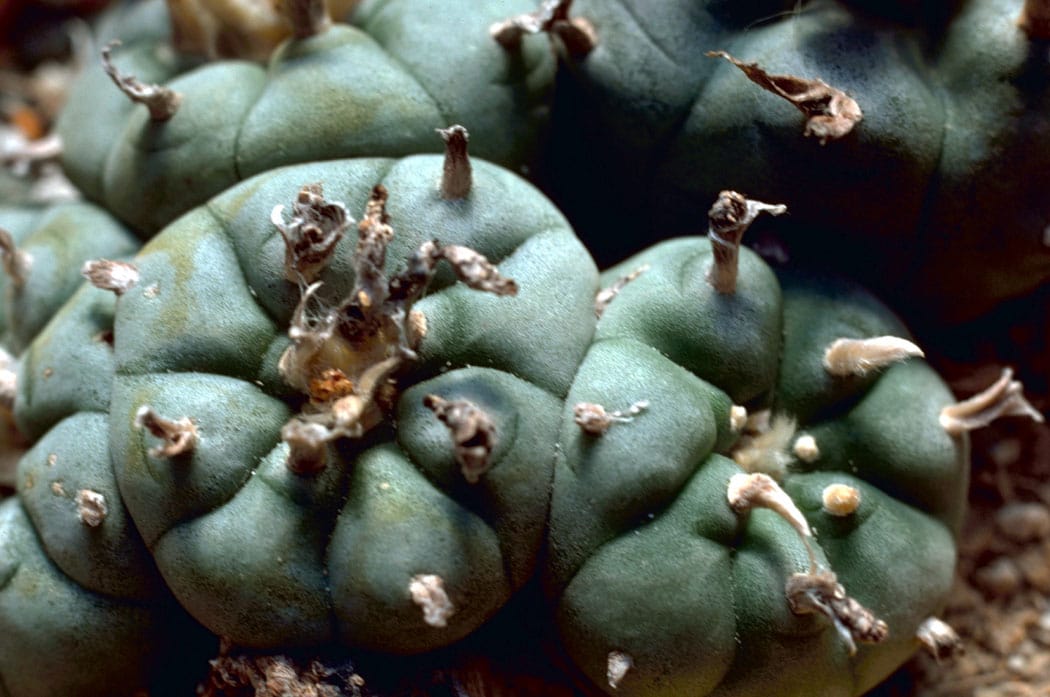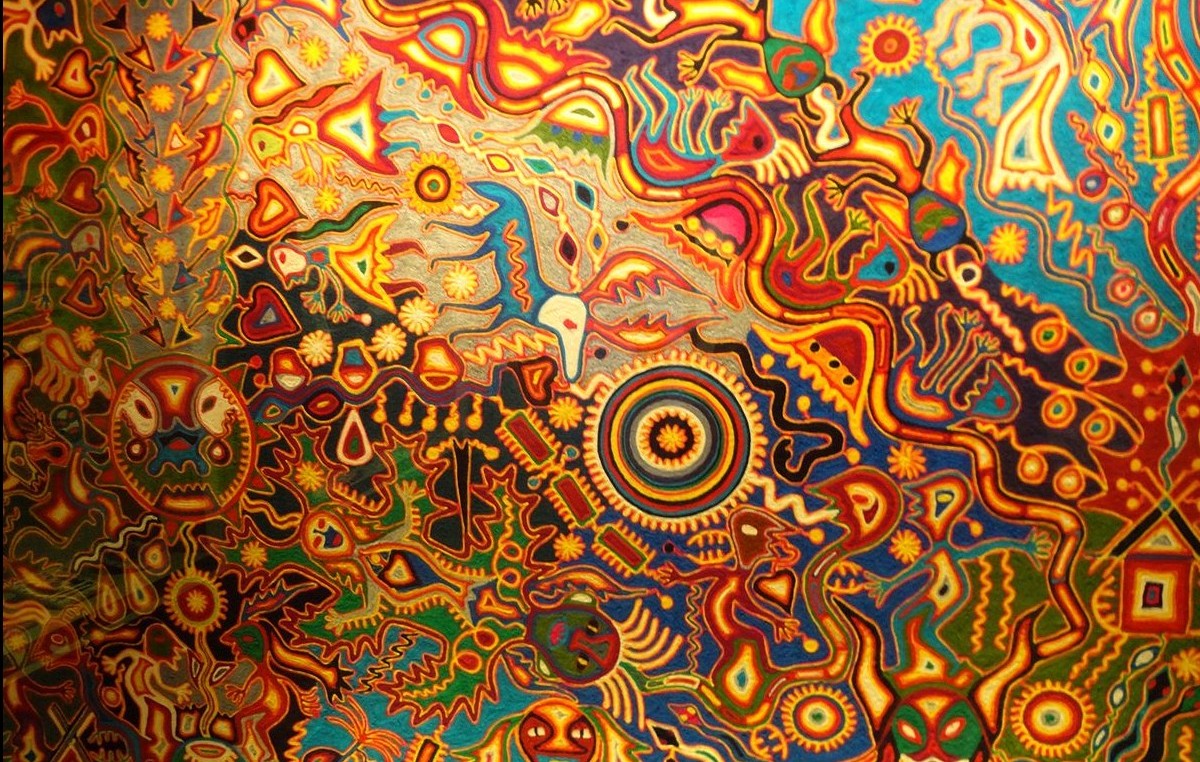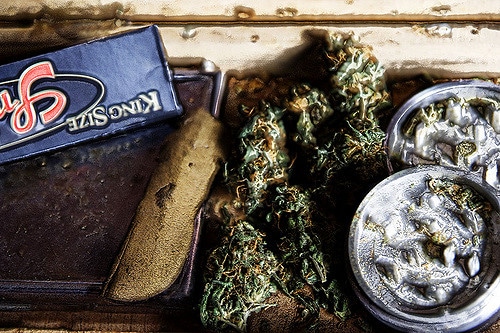
Mescaline, one of the “classic psychedelics,” is derived from the peyote cactus. Two recent studies show that psychedelic use decreases psychological distress and possibility of suicide. | Image Source: Wikimedia Commons
When it comes to psychedelic substances like LSD, psilocybin mushrooms, and mescaline, one stigma that’s hard to shake is that anyone who tries them is at risk of some degree of permanent brain damage. For those who have never tried psychedelics or who have heard only negative things in the decades-long War on Drugs, it’s an understandable fear. After all, people under the influence of psychedelics can act erratically and display behaviors that are far outside the realm of what is considered normal. However, two recent studies by US and Norwegian scientists are flipping this stigma on its head. Not only have both studies shown that classic psychedelics are not associated with mental health problems, they’ve illustrated that psychedelic use actually imparts a measurable positive effect on mental health.
The US Study: Classic Psychedelics Reduce Psychological Distress
“These findings indicate that classic psychedelics may hold promise in the prevention of suicide, supporting the view that classic psychedelics’ most highly restricted legal status should be reconsidered to facilitate scientific study, and suggesting that more extensive clinical research with classic psychedelics is warranted.” – Abstract from ‘Classic psychedelic use is associated with reduced psychological distress and suicidality in the United States adult population.”
– Abstract from “Classic psychedelic use is associated with reduced psychological distress…” [1.”Classic psychedelic use is associated with reduced psychological distress and suicidality in the United States adult population,” Journal of Psychopharmacology, January 13, 2015, https://jop.sagepub.com/content/29/3/280.]
In a study headed by Dr. Peter Hendricks of the University of Alabama at Birmingham, researchers combed over data from nearly 200,000 US adults to see if there was any correlation between psychedelic use and increased psychological distress or suicidality. The source of this trove of data was five years of recent surveys from the National Survey on Drug Use and Health which included detailed information on peoples’ history of drug use and psychological well-being. The psychedelics that were studied are considered “classic psychedelics” — LSD, psilocybin mushrooms, and mescaline — because they behave very similarly on a neurological level. Other hallucinogens such as MDMA, DMT, and ayahuasca, which have been shown to be safe in other research, were not involved in this study.
The findings of Dr. Hendrick’s study were clear — classic psychedelics are not harmful to mental health and may be useful in suicide prevention. Moreover, the authors specifically state in their abstract that they hope these findings will lead to further clinical research and a change in their legal status.
The Norwegian Study: Psychedelic Use Doesn’t Cause Mental Health Problems
“…[W]e found no significant associations between lifetime use of psychedelics and increased likelihood of past year serious psychological distress, mental health treatment, suicidal thoughts, suicidal plans and suicide attempt, depression and anxiety. We failed to find evidence that psychedelic use is an independent risk factor for mental health problems. Psychedelics are not known to harm the brain or other body organs or to cause addiction or compulsive use; serious adverse events involving psychedelics are extremely rare. Overall, it is difficult to see how prohibition of psychedelics can be justified as a public health measure.”
– Abstract from “Psychedelics not linked to mental health problems or suicidal behavior..”[2.”Psychedelics not linked to mental health problems or suicidal behavior: A population study,” Journal of Psychopharmacology, March 5, 2015, https://jop.sagepub.com/content/29/3/270.]
A similar study headed by Norwegian scientists Pål-Ørjan Johansen and Teri Suzanne Krebs found nearly identical results. Using a different data set consisting of 130,000 US adults (roughly 20,000 of which were psychedelic users), Johansen and Krebs found that classic psychedelics once again were not associated with mental health problems or suicidal behavior. Specifically, the researchers stated that they failed to find evidence that psychedelic use alone could cause mental health problems. To ensure the highest level of accuracy, adjustments were made for sociodemographics, use of other drugs, and histories of child depression. And echoing Dr. Hendrick’s study in the US, Johansen and Krebs also conclude that the classification of these substances as illegal under the guise of protecting public health is simply not justified.
This is Your Brain on Drugs
These studies herald wonderful news for the potential new uses of classic psychedelics for applications like suicide prevention. They serve to reinforce the growing body of clinical research that shows the overwhelming safety of psychedelics.
Of course, it’s important to remember that psychedelics are powerful tools that should always be approached responsibly rather than recklessly. The data shows that risks associated with psychedelics are low for a large population, but that’s not to say there aren’t those who’ve experienced harm from a bad psychedelic experience; conditions like hallucinogen persisting perception disorder (HPPD) are extremely rare, but they do occur.
The best way to truly understand the risks and benefits of psychedelic experiences is to perform more research and to scientifically approach the topic of psychedelic use. Already, our old cultural stereotypes about psychedelics as dangerous substances that “fry your brain” are starting to fall away, and more studies like these only supports the case to reconsider their legal status.









